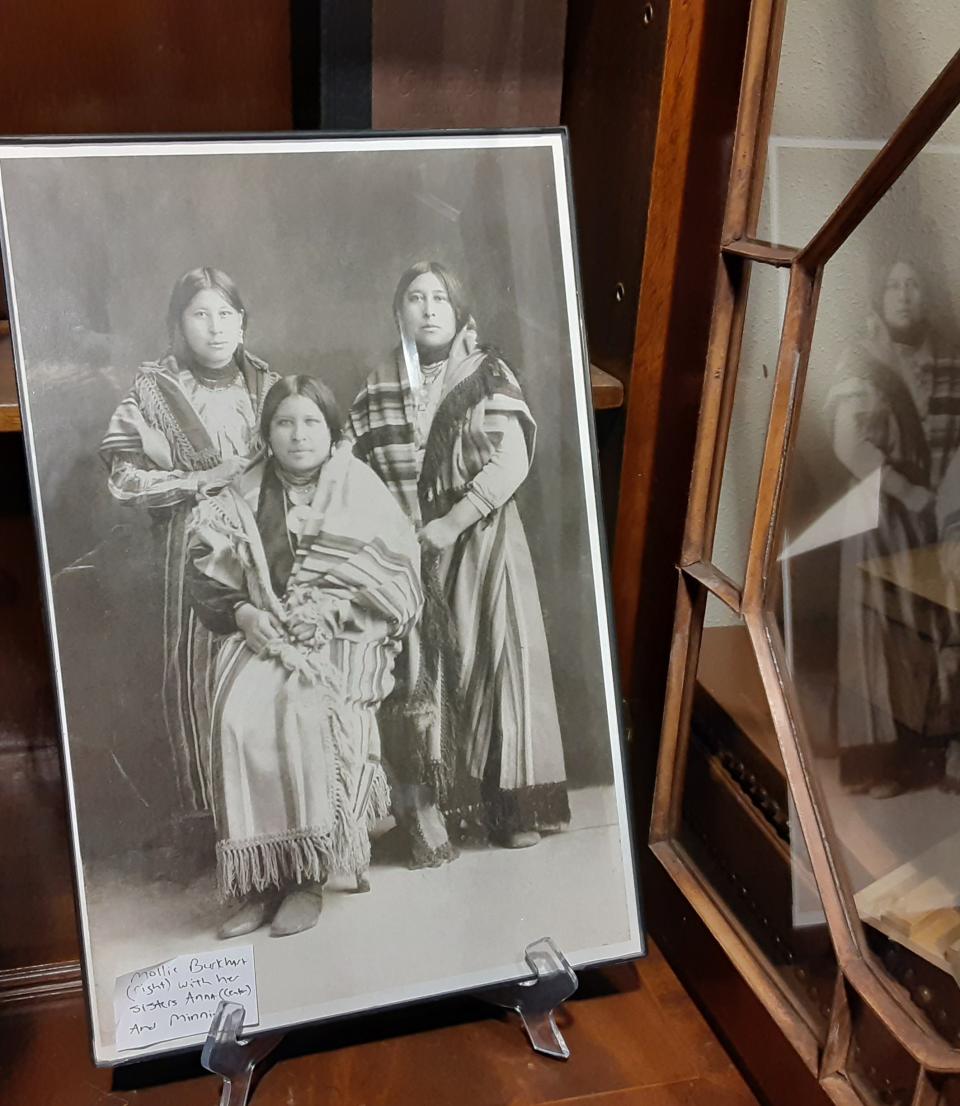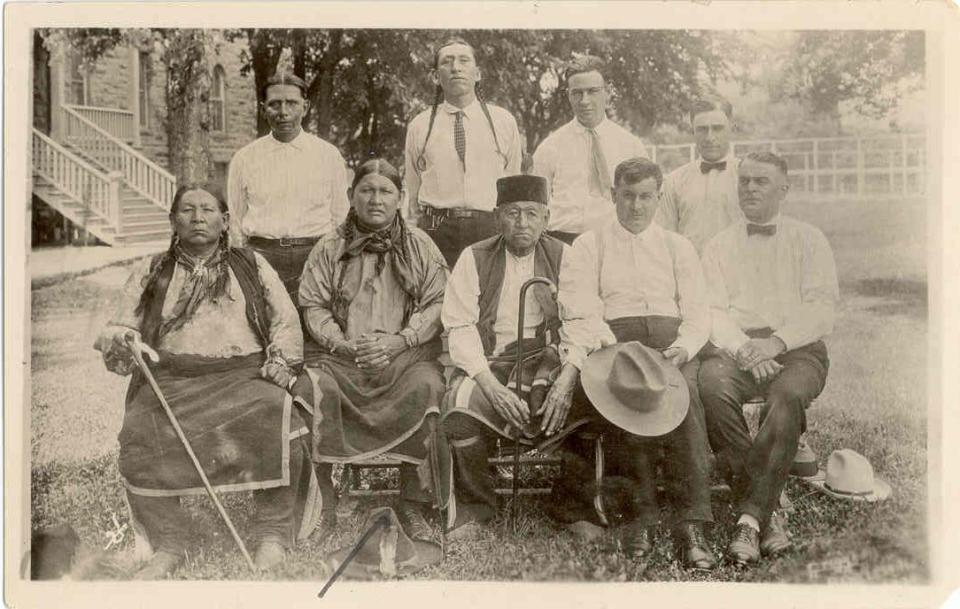Who were Ernest and Mollie Burkhart? The true story behind 'Killers of the Flower Moon'
One of the largest movie productions ever launched in Oklahoma is about to hit the big screen. Martin Scorsese's "Killers of the Flower Moon" is set to premiere on Friday, Oct. 20. Starring Leonardo DiCaprio, Lily Gladstone and Robert De Niro, the film is based on a true story of murders in Oklahoma a century ago.
Set in 1920s Oklahoma when oil was discovered on the Osage Nation's land, the story follows the murders of several Indigenous people. Ernest Burkhart (DiCaprio) and his wife Mollie (Gladstone) met in Oklahoma, where Burkhart's uncle William Hale (DeNiro) resided.
The movie was largely filmed in Oklahoma where these on-screen characters based on real-life people experienced these true events.
'Killers of the Flower Moon' premiere: Learn more about the true history, Osage people who made film
Note: Spoilers ahead.
Fairfax, Oklahoma: Ernest Burkhart meets Mollie Kyle
Ernest Burkhart moved to Oklahoma with his brother in search of jobs in the oil industry. He arrived in 1912 and moved in with his uncle, William Hale.
They resided at his ranch in Gray Horse, about 20 miles west of Pawhuska, which is the county seat of Osage County. Hale was a cattleman, but also partially owned a bank, a grocery store and a funeral home in Fairfax.

Burkhart would run errands for his uncle as well as work as a taxi driver. It was in this role that he met his future wife, then known as Mollie Kyle, according to David Grann, the author of the book on which the film is based.
Mollie was Osage but spoke some English and eventually, Ernest learned some of her language, too. The two fell in love, and with Hale's encouragement, they married in 1917.
Dig deeper: What does the Oklahoma state flag have to do with 'Killers of the Flower Moon?' A lot.
How rich were the Osage? Oil and the 'headright' system.
Oil had been discovered on the Osage Nation's reservation in Oklahoma around the turn of the 20th century. The tribe had bought the land from the federal government years earlier after being driven from their homelands.
Leading up to Oklahoma statehood, the U.S. Congress passed the 1906 Osage Allotment Act, legislating that property and mineral income be distributed equally among the more than 2,200 members of the tribe. One equal share became known as a headright — one right per head — and once a headright owner dies, it passes to the next legal heir, even if that heir wasn't Osage.
Headrights allowed Osage to earn royalties on oil sales. Those looking for a share of those profits had to pay them for leases to explore and produce oil on their land, too. As demand grew and more and more oil was discovered, it generated millions of dollars for the Osage.
In 1921, the federal government mandated that the Osage people were incapable of managing their own wealth and assigned court-appointed white guardians to them, many of whom often swindled them out of their fortunes.
According to Grann, the Osage were considered the wealthiest people per capita in the world, earning $30 million in 1923, the equivalent of $400 million dollars today.
More: Does the Pioneer Woman live on stolen Osage land depicted in 'Killers of the Flower Moon?'
Osage 'Reign of Terror' and the FBI
Between 1921 and 1925, there were more than 60 mysterious or unsolved murders in Osage County, all connected with Osage headright holders. Some were shot, some were poisoned, and a few were even bombed in what became known as the "Reign of Terror."
One of the first victims was Mollie's sister Anna, who was found dead after being shot in May 1921. Her estate was awarded to her mother who suspiciously died two months later. Several other Osage continued to be killed at this time including more and more relatives of Mollie, leaving her and her husband as the lone inheritors of their wealth.
Mollie would later survive an attempt by Ernest to poison her, too. If both she and Ernest Burkhart had died, the inheritance would have flowed to his uncle Hale.
Parallel tragedies: Osage Murders, Tulsa Race Massacre started days apart

As the number of murders grew, the Osage Tribal Council sought the aid of the U.S. government. The Bureau of Investigation (later known as the Federal Bureau of Investigation or FBI) stepped in, identifying Hale, Burkhart, and another man, John Ramsey, as suspects.
Ramsey was charged with Anna's murder, a crime that Kelsie Morrison said Hale and Burkhart's brother Bryan paid him to do. In a case surrounding Mollie's cousin, Ramsey said Hale hired him to shoot and kill Henry Roan, on whom Hale held a $25,000 insurance policy. He said he was involved in the murder of Mollie's sister and brother-in-law at the direction of Burkhart, a crime Burkhart confessed to.
Burkhart was sentenced to life in prison in 1926 and Mollie divorced him. He later returned to court and testified against Hale and Ramsey in a second trial on Roan's murder.
During the previous trial, which Hale won on appeal, he sold his ranch to the Drummond family, who are now known for famous members like "Pioneer Woman" Ree Drummond and Oklahoma Attorney General Gentner Drummond.
Both Hale and Ramsey were found guilty were sentenced to life in prison in 1929.
Teaching history: Can 'Killers of the Flower Moon' be taught in Oklahoma classrooms? Teachers not sure under law
William Hale was pardoned once. Why was Ernest Burkhart pardoned twice?
After just over ten years in prison, Burkhart was paroled in 1937 but returned to jail a short time later after robbing his former sister-in-law Lillie Morrell Burkhart.

His parole was revoked when he was sentenced to jail in 1941. He was imprisoned until 1966 when he applied for parole again, a motion that was granted by the state's governor after a 3-2 vote by the Oklahoma Parole Board. His cooperation in the initial investigation 40 years earlier was cited as a reason why.
Hale was pardoned almost a decade earlier in 1947 despite protests by the Osage Nation.
"If that damn Ernest had kept his mouth shut we'd be rich today," Hale said, according to relatives who spoke with Grann.
'Reign of Terror' in Oklahoma: The harrowing history behind a string of Osage murders
What happened to Mollie Burkhart?
Family members say Mollie was shunned by the Osage community for standing by her then-husband until he confessed in 1926. After divorcing him, Mollie married John Cobb. She died at the age of 50 in 1937.
The children she had with Ernest inherited the Kyle family fortune, which was considerably reduced after the Great Depression. Oil production also began to slow in the region, with the money the current generation earns amounting to being "not enough to live on," Margie Burkhart, the granddaughter of Mollie and Ernest, told Grann in his book.
The impact of her grandfather's actions still lives with Osage like Margie today.
“I have a lot of anger towards him,” Margie told People magazine. “He took away my whole family. He took away potential cousins. I don't have any relatives on my Osage side.”
Leonardo DiCaprio wasn't originally cast as Ernest Burkhart
Original versions of the "Killers of the Flower Moon" movie script were written from the perspective of federal investigators piecing together the crime. DiCaprio was set to play agent Tom White, but a small scene between Mollie and Ernest helped him and Scorsese rethink the film's focus.
“After a certain point, I realized I was making a movie about all the white guys," Scorsese told Time magazine.
“It just didn’t feel like it got to the heart of it,” DiCaprio told "British Vogue" magazine. “We weren’t immersed in the Osage story."
With a change to focus on Ernest and Mollie's relationship and the betrayal that transpired, DiCaprio switched roles and Jesse Plemmons stepped in to play a revamped version of White.
Script rewrite put Lily Gladstone as Mollie Burkhart at center of 'Killers of the Flower Moon'
Gladstone, 37, a NiMíiPuu, or Nez Perce, and Siksikaitsitapi, or Blackfeet, actor had a role in the series "Reservation Dog," which was also filmed in Oklahoma.
"Oklahoma's become very, very dear to me," said Gladstone, who was raised in Montana.
Her role as Mollie comes in a big-budget movie widely expected to be a contender for multiple Academy Awards. Should Gladstone be nominated, she would be just the fourth-ever Indigenous person nominated in the category.
This article originally appeared on Austin American-Statesman: Killers of the Flower Moon's true story: Ernest and Mollie Burkhart
